- Home
- Donis Casey
Hell With the Lid Blown Off Page 5
Hell With the Lid Blown Off Read online
Page 5
My half-hearted answer served to get Wallace to rattling his saber again. “I’m eager for the warrior’s life, Trent. It’s the best way I know for a man to test himself, to come face-to-face with his demons and do battle with them. To find out what he’s made of.”
I heard Randal sigh, but he didn’t say anything. Neither did I. Boynton wasn’t much of a Sodom or a Gomorrah, either, but since I had been a deputy I had seen enough violence and foolish behavior to do me.
“A soldier’s life can be verra noble,” Miz MacKenzie said. “It’s a life of great sacrifice, laddies, for the peace and safety of others.” She eased herself back into her big armchair. “Both your grandfathers were soldiers in their time, Wallace, and your father, too. All acquitted themselves proudly on the field. My Dada, your great-grandda Hamilton Bruce, was a field surgeon with the 42nd Regiment of Foot, and fought under General Campbell at the Battle of Alma in fifty-four.”
“Was that before he became an Admiral along with Nelson and then King of Scotland, Gram?” Wallace had heard it all before. He was teasing his grandmother, but Randal leaned forward.
“In the Crimea?”
Miz Beckie’s eyes got wide. “Aye! Do you know about the Battle of Alma?”
“Medicine is my avocation, but history is my passion,” Randal said. “That battle was a turning point of the Crimean war, largely due to the Black Watch.”
Wallace flopped back in his chair. He looked put out, but he sounded amused. “Here we go again! You’ll be sorry you got him started, Granny.”
“What is Black Watch?” Ruth asked.
Randal turned to look at her. “That’s the nickname for the British Army’s 42nd Regiment of Foot. They’re called that because the tartan they wear is so dark.”
As far as I was concerned they might as well have been speaking Chinese. I had never heard of Crimea or the 42nd Regiment of Foot, and when it came to tartan, I had no idea what they were talking about. I’d have asked if I weren’t ashamed of being so ignorant.
“Mama has a little piece of tartan cloth that her I-don’t-know-how-many-greats grandfather brought over with him.” Ruth made a little square with her fingers. “It’s about yea big, kind of gray-brown, now, all faded. We don’t know exactly what it was for, but the family story is that he was forbidden to have it in the old country and kept it hidden under his shirt until he came over here.”
“Isn’t your mother’s maiden name Gunn? That’s a Highland name, you know.”
Wallace clapped his hand to his forehead. “Oh, no, Ruth! You’ve opened the barn door! Neither Randal or Gran can be stopped now.”
Randal laughed, but Miz Beckie was affronted. “Well, Ruth dear, apparently Wallace has heard enough about tartans to last him a lifetime.”
“I don’t know, Miz MacKenzie,” I said. “I’d like to hear about it.”
Wallace stood up. “That’s it for me.”
His grandmother waved him back down. “Don’t be rude, Wallace. Don’t worry, we won’t bore you. Thank you, Trent. Perhaps you’ll come back for tea someday and I’ll tell you and Ruth all about it.” She turned to face Randal. “I still have my father’s Black Watch regalia, Randal dear. He kept his entire uniform, from bonnet to ghillies. I’d never part with it for anything.”
Randal straightened up, interested. “Oh, I’d love to see it, Miz Beckie.”
“So would I,” Ruth seconded, and I put in that I’d be interested in getting a gander myself. We all shot Wallace a sour look, but instead of throwing cold water on the proceedings, he volunteered to go upstairs and fetch it.
“I know right where it is, Gran. After all, you’ve made me look at it enough times.”
He brought down from upstairs an old cedar-lined wooden box about three feet by three feet and maybe two feet deep, and placed it on the tea table in front of his grandmother’s chair.
She opened the box like it contained treasure, which I guess to her it did. It was late in the day and not much sun left to come through the tall windows. At first it looked to me like the piece of cloth she drew out really was black. But when she held it up I could see that it was dark green and blue checks.
“This is his feile-beag,” she said. “In English it’s called a kilt.”
It looked like a short skirt to me, heavy wool with sharp pleats all across the back. I’ll admit that I was a mite shocked to think of a man wearing something like that. Especially a soldier! I didn’t say a word, though. Ruth and Randal both looked real interested and even Wallace acted like a man wearing a skirt was the most natural thing in the world. Miz MacKenzie draped the kilt over her lap and commenced to drawing out the rest of the outfit, piece by piece, and telling us about each one, her voice as reverent as if she was describing Jesus’ swaddling clothes.
“These are his hose and flashes…” The wildest tall checkered socks I ever did see, and some rags I figured he used for garters. “His uniform shirt…” Old-fashioned puffy sleeves, but at least it looked like a regular soldier’s blouse, tan, with regimental insignia on the shoulder. “His sporran…” Looked like a lady’s handbag to me. “His ghillies…” Shoes with a bunch of holes punched in them! “…and bonnet.”
A bonnet! I declare. It was a dark blue color, broad and shapeless, and had a round silver pin on one side. All I could think was that these old Scotch soldiers must have been the meanest, most vicious, most brawl-loving, sons-of-guns ever born to wear a getup like that, because they wouldn’t be able to step out the door without somebody trying to beat them up.
But then Miz MacKenzie lifted something out of the box that looked like either a real short sword or a terrible long knife, maybe two feet long, and I revised my opinion of the outfit right quick. It had a fancy carved wooden haft with an amber stone on the end of it, and the black leather-covered scabbard was chased with silver. She drew it out to let us see the blade. I leaned forward all eager to look at it, and the other fellows did, too. I was aware that instead of leaning in, Ruth drew back. I expect that’s the difference between fellows and girls.
“This is called a dirk,” Miz MacKenzie told us. “It’s just for fancy dress, though, lads. I reckon folks stopped stabbing one another with these a hundred years ago.” She slid the blade back into its scabbard and laid the dirk on the table before she reached into the box again. “Now, this…” She held up another knife, much smaller, maybe eight inches long in all, with a bone handle and a flat leather scabbard. “This is the kind of a knife that means business.” She unsheathed it and held it point up in front of her face. “Da called this a sgian dubh, a black knife. So called because you used it whenever you were in a black situation, children. Your knife of last resort. You keep it tucked into your hose, like this.” She showed us by holding it down beside her calf.
We fellows clamored to have a look and she let us pass it around while she refolded the uniform and carefully put all the pieces back into the chest. When it came around to me, I ran my thumb along the wicked little blade. One edge was grooved and the other was razor-sharp, like a skinning knife, and it came to a point at the end. I recognized a fine weapon when I saw one and handed it back to the old lady with regret.
After she closed the lid, she sat looking down at the box on the table before her, lost in her memories. When she looked up again, she smiled. “This will be yours some day, Wallace. I hope you’ll cherish it as much as I do.”
I expected Wallace to make a smart remark, but to my surprise he said the right thing for once. “It’ll be doubly dear to me, Gran, since it means so much to you.”
Miz MacKenzie teared up for a second, but took herself in hand right quick. “I’m glad to hear it, dear. Someday I’ll impose upon you to try it on for me. You resemble my dearest Da, in size and coloring at least, and I’d love to see how it looks on you once before I die.”
“That would be an excellent idea, Wallace,” Randal seconded.
&nb
sp; Wallace grinned. “Perhaps that can be arranged, Grandmother, some dark night when no one is around and all the curtains are drawn.”
Josie Cecil
The First Christian Church had moved around quite a bit since its founding shortly after the town of Boynton, Oklahoma, came into being in 1902. For a while the congregation met on the second floor above the Bank of Oklahoma. Then when the membership grew too large for that location, the church moved to the Masonic Hall. The hall was a perfectly adequate location for several years, certainly big enough to accommodate the church’s growth. But after all, a church needs a permanent home, same as a person.
For the past couple of years, the elders and deacons had been raising money to buy land and raise a building. But the Lord does provide, and recently the North Methodist Church had consolidated with the South Methodist Church and the two congregations had moved in together, leaving the North location vacant. The church was a perfectly lovely little red-brick building with a bell tower and steeple on one end. The ground floor held the sanctuary, and the basement contained a fellowship hall and a couple of rooms just right for Sunday School classes.
The new pastor, Mr. Bennet, and Mr. Skidmore, the Sunday School superintendent, called an emergency meeting of the governing board the minute they heard that the North Methodists were vacating. The board voted unanimously to put in a bid on the building, and the Methodists accepted.
The first meeting in the newly dedicated church was scheduled for the first day of July, so to commemorate the last service in the Masonic Hall at the end of June, the ladies of the church planned a big picnic to be held after the last Amen was said.
Considering that it had been a cool, mild spring to now, the final Sunday of June was hot and dry and crackling. While the women unpacked the pies and soups and salads and cold meats they had carefully brought from home in crates and baskets, and laid them out on the long board-and-sawhorse tables under the trees, the men and children milled about, impatient and hungry, fanning themselves and talking too loudly. Mrs. Bennet stood at one end of the picnic table and Alafair’s sister-in-law, Josie Cecil, stood at the other, directing the proceedings with the efficiency of a couple of sergeant majors.
You couldn’t swing a cat, Alafair thought, without hitting a Tucker. Shaw’s mother, Sally, and stepfather, Peter McBride, sat on hardback chairs under a spreading live oak, holding forth among the rest of the elders. Shaw and various of his brothers, cousins, and neighbors were arrayed along the side of the building and energetically discussing whether or not the United States should get involved in Mexico and how the European war had affected the price of cotton.
With their blessed events pending, John Lee and Phoebe had decided to stay home, as had Alice and Walter. But her eldest girls, Martha and Mary, were there, which pleased Alafair no end. The youngsters had organized a game of baseball in the field to the west of the building—all but Alafair’s youngest, Grace, who was still unwilling to let her mother out of her sight after their month-long separation earlier in the year.
Ruth and Beckie were inside the hall, planning the post-picnic sing-along and hymns for the afternoon prayer meeting. Since Beckie was a Presbyterian, her presence at this special service showed in what high regard she held her protégée.
Alafair and Martha stood at the end of the table and sliced pies, chatting happily with Josie. It was quite a while before Alafair noticed that her helper Grace had acquired a playmate and abandoned her post at her mother’s side. Grace was sitting in the grass, engaged in make-believe with a very blond child just a little older than she. It took Alafair a moment to recognize Lovelle Beldon, the youngest by far of the Beldon brood.
“Is Mildrey Beldon here?” Alafair asked her sister-in-law, surprised. “I never saw her during the service.”
Josie’s gaze followed Alafair’s. “Oh, yes, Mildrey came in late and sat at the back with Lovelle. There she is yonder.” The mother of the Beldon brood was standing at the center of the table, dishing out baked beans. Josie snorted out what could have been a laugh. “I don’t see any of them boys, I’m glad to say.”
Martha smiled. “Poor Miz Beldon. She’s a nice woman. I never could figure out how such a kind creature managed to raise so many wastes of breath.”
There were six Beldon boys in all; Jubal, Hosea, Ephraim, Hezekiah, Zadok, and Caleb. That’s how many tries it had taken Mildrey to produce the golden-haired light of her life who was now creating a doll town with Grace. Lovelle was five years old. The youngest son Caleb was twenty.
“Well, I hate to speak ill of the dead,” Josie said under her breath, preparing to do just that. “But I blame the daddy. It takes a good daddy to raise good men.”
Alafair shook her head. “All Mildrey’s affection seems to be lavished on that girl.”
“Well, Mildrey long gave up her hopes of a daughter before Lovelle made her surprise entrance into the world.” Josie sounded quite sure of herself. “Mildrey Beldon has a lot of love in her, and all those boys don’t appear to be interested in anything about their mother except her cooking.”
Alafair thought that was probably true. All the boys were grown, but not one of them had bestirred himself to marry. They all seemed happy enough to let their mother look after them. Except for Jubal, they were something of a worthless lot, as far as Alafair could see.
Mildrey Beldon
Josie waved at Mildrey. “Hey, Mildrey, come on up here and help us dish out pie!”
Mildrey looked surprised by the invitation. She may have been known around town as a good Christian woman, but she bore the taint of her hooligan sons, and few ladies went out of their way to befriend her.
She cast a glance behind to make sure that Josie hadn’t been calling to someone else, and when she could find no other candidates for the invitation, made her way down the length of the table and squeezed in next to Alafair.
Josie Cecil was a force to be reckoned with; tall and buxom, black-haired, with warm, laughing, no-nonsense, hazel eyes. She had no truck with gossip and was skeptical of popular opinion. She had told Alafair more than once that she was perfectly capable of making her own decisions about folks, thank you very much.
Mildrey had probably been a pretty woman in her youth, but a lifetime of drudgery had ravaged whatever beauty she had once possessed. Her face was seamed and her blue eyes sad and faded, but the light brown hair rolled into a chignon was still thick and lustrous.
Alafair and Martha each gave her a welcoming smile and Mildrey answered with a tentative smile of her own. But it was Josie who broke the ice. “How nice to see you again, Mildrey! I swan, you’ve been making yourself scarce of late. What have you been getting yourself up to?”
“Nothing interesting, I guarantee,” Mildrey said. “Y’all know how it is when you’ve got a farm to run and a passel of mouths to feed.” She looked at Alafair for confirmation.
Alafair obliged. “I can attest to the truth of that.”
Josie relieved Mildrey of the empty plate she was clutching and began to cover it with slices of pie and cake. The oldest of Shaw Tucker’s several siblings, Josie had been mothering everyone she came in contact with since before she could remember. “I see Lovelle over yonder. My, but she has grown! What a pretty child.”
The smile that lit Mildrey’s face as she contemplated her darling made her look years younger. “She’s a fine girl, too. Never has give me a lick of trouble in her life.”
“Can’t say that for boys, can you? They’re always getting up to something and giving their ma cause to tear her hair.” The mother of three boys herself, Josie felt entitled to offer the judgment.
Mildrey’s smile was wry. “No, you can’t.”
“I heard that Mr. Turner fired your youngest from the livery stable after just two weeks.”
Josie’s comment stung. Mildrey’s expression made that obvious. “That’s so.”
“Got in a
fistfight when Hec Lawrence criticized the way he cinched a saddle,” Josie continued, ever sympathetic but unaware of her effect on the embarrassed mother.
Alafair glanced at Martha, who nodded and slipped away.
“I expect your boy is back on the farm with you,” Josie continued blithely. “Now, if he was my young’un…oh, look here!”
Martha was approaching with Josie’s daughter-in-law, who was holding in her arms the apple of Josie’s eye, her infant grandchild. Alafair took advantage of the distraction to put her hand on Mildrey’s arm. “I see a couple of empty chairs over there under the hickory tree. Let’s us go have a seat.” Mildrey looked glad for the easy escape.
“Josie don’t mean anything,” Alafair assured her as they walked. “She’d give you her last nickel without you asking.”
Mildrey nodded. “I know it. Miz Cecil has been mighty good to me since D.J. crossed over.”
“How are y’all doing out there without D.J.?” Alafair asked, as soon as they got settled in their chairs. The patriarch of the Beldon clan had passed into the arms of the Lord earlier that year, leaving Mildrey to the tender mercies of their six unmarried sons.
Mildrey shrugged. “Nothing’s changed much.” She didn’t seem overly upset about her recent widowhood. “I was afeared at first that all them boys would run amok. I mean even worse than they did beforehand. D.J. pretty much made them toe the line, at least when they was around him. He left the farm lock, stock, and barrel to Jubal, as long as I can live there for the rest of my natural life, so at least he done me that good. I about half-expected Jubal to kick his brothers to the road, but he didn’t. They ain’t much in the way of farmhands, but they don’t cost nothing and they’re better than nobody, I reckon. That’s what D.J. always said, anyway.”

 The Wrong Girl
The Wrong Girl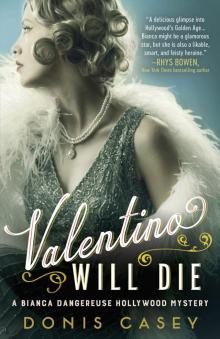 Valentino Will Die
Valentino Will Die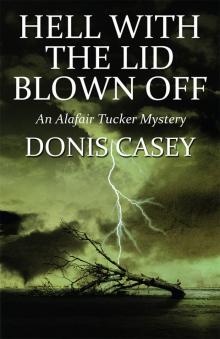 Hell With the Lid Blown Off
Hell With the Lid Blown Off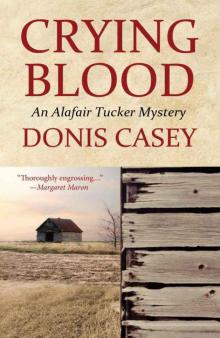 Crying Blood - An Alafair Tucker Mystery
Crying Blood - An Alafair Tucker Mystery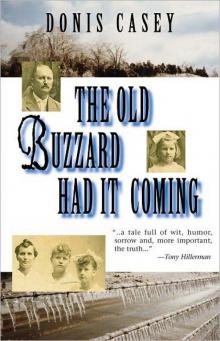 The Old Buzzard Had It Coming: An Alafair Tucker Mystery
The Old Buzzard Had It Coming: An Alafair Tucker Mystery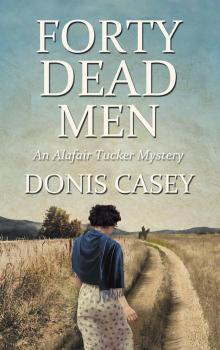 Forty Dead Men
Forty Dead Men All Men Fear Me
All Men Fear Me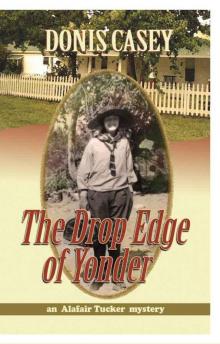 The Drop Edge of Yonder - An Alafair Tucker Mystery
The Drop Edge of Yonder - An Alafair Tucker Mystery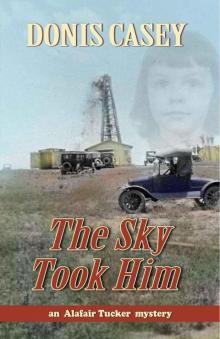 The Sky Took Him - An Alafair Tucker Mystery
The Sky Took Him - An Alafair Tucker Mystery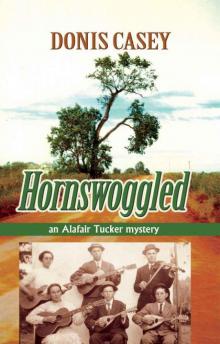 Hornswoggled - An Alafair Tucker Mystery
Hornswoggled - An Alafair Tucker Mystery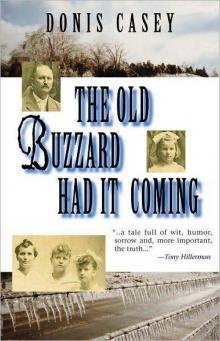 The Old Buzzard Had It Coming
The Old Buzzard Had It Coming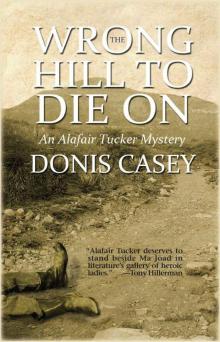 The Wrong Hill to Die On: An Alafair Tucker Mystery #6 (Alafair Tucker Mysteries)
The Wrong Hill to Die On: An Alafair Tucker Mystery #6 (Alafair Tucker Mysteries)